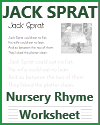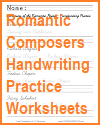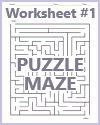Baa, Baa, Black Sheep |
| www.studenthandouts.com > Printable Texts > Nursery Rhyme Worksheets |
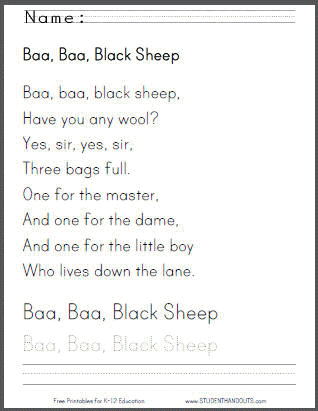 This free printable features the popular children's nursery rhyme "Baa, Baa, Black Sheep." Children read aloud, then practice writing the title.
This free printable features the popular children's nursery rhyme "Baa, Baa, Black Sheep." Children read aloud, then practice writing the title.Baa, baa, black sheep, Have you any wool? Yes, sir, yes, sir, Three bags full. One for the master, And one for the dame, And one for the little boy Who lives down the lane. 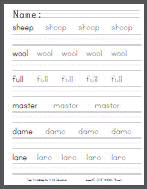 Click here to print the sheet to the right.
Click here to print the sheet to the right.As an extension activity, have children note the rhyming words: wool/full and dame/lane. Click here to print the handwriting practice worksheet to the left. It features the terms: sheep, wool, full, master, dame, and lane. |
The nursery rhyme "Baa, Baa, Black Sheep" has a long history, and its origins can be traced back to the 18th century in England. The rhyme has undergone variations over time, and its meaning and interpretation have evolved. The earliest known version of "Baa, Baa, Black Sheep" appeared in a collection of nursery rhymes called "Tommy Thumb's Pretty Song Book," which was published in London in 1744. The rhyme was originally titled "Bah, Bah, Black Sheep."
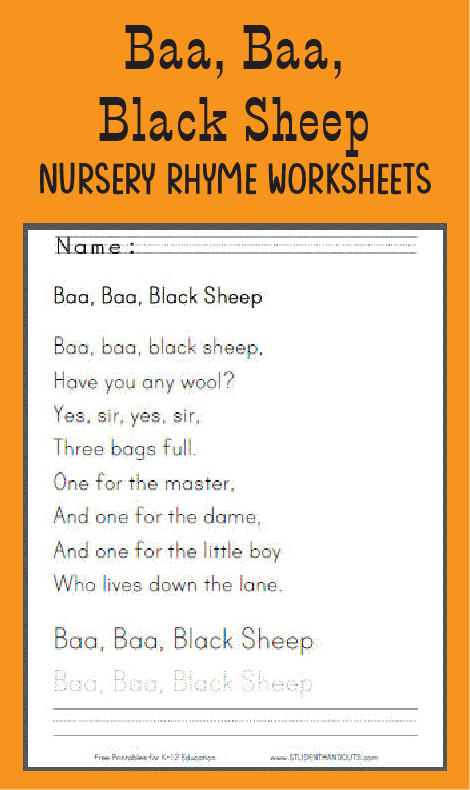 The original version of the rhyme goes as follows:
The original version of the rhyme goes as follows:
Bah, Bah, a black Sheep, Have you any Wool? Yes merry have I, Three Bags full, Two for my Master, One for my Dame, None for the Little Boy That cries in the lane. This version emphasizes the division of wool among the master, dame, and the little boy. Over time, the rhyme underwent various adaptations, including changes in the lyrics. In some versions, the rhyme evolved to reflect different cultural contexts and sensitivities. One common variation replaced "black" with "any," resulting in "Baa, Baa, Any Sheep." The meaning and interpretation of "Baa, Baa, Black Sheep" have been the subject of discussion and debate. Some interpretations suggest that the rhyme might have historical connections to the wool trade in medieval England, where wool was an important commodity. Others believe it may have more symbolic or social significance, including references to taxation and class divisions. Today, "Baa, Baa, Black Sheep" remains a popular nursery rhyme and children's song. The rhyme continues to be a part of early childhood education and entertainment. |
 |
|---|
| www.studenthandouts.com > Printable Texts > Nursery Rhyme Worksheets |


